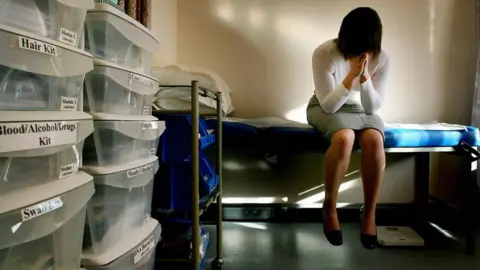Women 'completely let down' in rape investigations
 PA Media
PA MediaWomen are being "completely let down" by the justice system, according to a report examining the way rape cases are investigated and prosecuted.
The report by several women's groups identified "catastrophic systemic failures" which are "longstanding".
It is to be given to MPs on Monday, ahead of the government's rape review.
Changes it recommends include no longer examining an alleged victim's sexual history in rape trials and urgent research into what survivors want.
"Rape as a public policy issue needs to go right up the political agenda," said campaigner Sarah Green.
The report's contributors included organisations including Rape Crisis, the Centre for Women's Justice (CWJ), the End Violence Against Women (EVAW) Coalition, and BAME anti-violence campaign group Imkaan, and sought the views of rape and serious sexual assault victims.
It found several recurring barriers to justice, including persistent myths that rape victims were "asking for it" or had dressed provocatively.
It revealed cases that were dropped following scrutiny of mobile phone messages which suggested the defendant might have had a "reasonable belief" that the alleged victim consented to sex, despite medical evidence to the contrary.
"Despite legislation and policies that have imposed legal duties on the police and prosecutors to effectively investigate and prosecute rape, despite clear guidance on disregarding myths and stereotypes, and other measures designed to ensure fair trials - our report reveals catastrophic systemic failures in the criminal justice system that embolden serial rapists and misogynists and abandon traumatised victims," said Harriet Wistrich, CWJ director.
Figures released by the Crown Prosecution Service (CPS) in July showed the number of rape convictions in England and Wales had fallen to a record low.
In 2019-20, 1,439 alleged rapists were convicted of rape or another crime - half the number three years ago. The number of completed prosecutions in "rape-flagged" cases was the lowest since tracking began in 2009.
It led women's groups to suggest rape was being "de-criminalised", with perpetrators unlikely to face prosecution.
Ministerial leadership
Monday's report also recommends "stronger leadership" on sexual offences within the police and Crown Prosecution Service, specialist support for marginalised women and the creation of a ministerial post to focus on serious sexual offending.
"Real change requires criminal justice institutions to be held fully accountable and leadership in those institutions to demonstrate an absolute commitment to ensure anyone working in this area understands rape culture and is determined to tackle it," observed Ms Wistrich.
The report also demands urgent research into the reporting of rape - who does and who doesn't go to the police and why - and understanding what survivors want from the justice system.
It stated that failures in prosecuting rape and sexual assault cases were "longstanding" and there was broad consensus across this and previous reports into the issue over those failings and what needed to be done.
"It can feel as though the repeated commissioning of these reviews and inspections is a way for Government and other authorities to indicate concern, while never following through with the action and resources needed to make change," the report states.
Ms Green, EVAW coalition director, urged the government "to commit to long-term change".
"The evidence is clear: women are being completely let down and discriminated against by the justice system," she said.
"Rape as a public policy issue needs to go right up the political agenda, with a clear ministerial lead and the intention to completely turn the current situation around."
